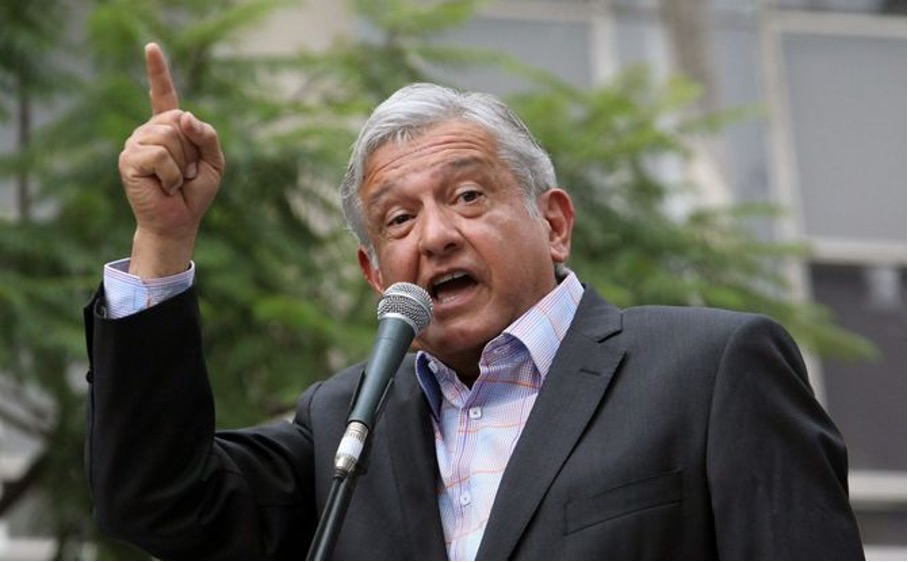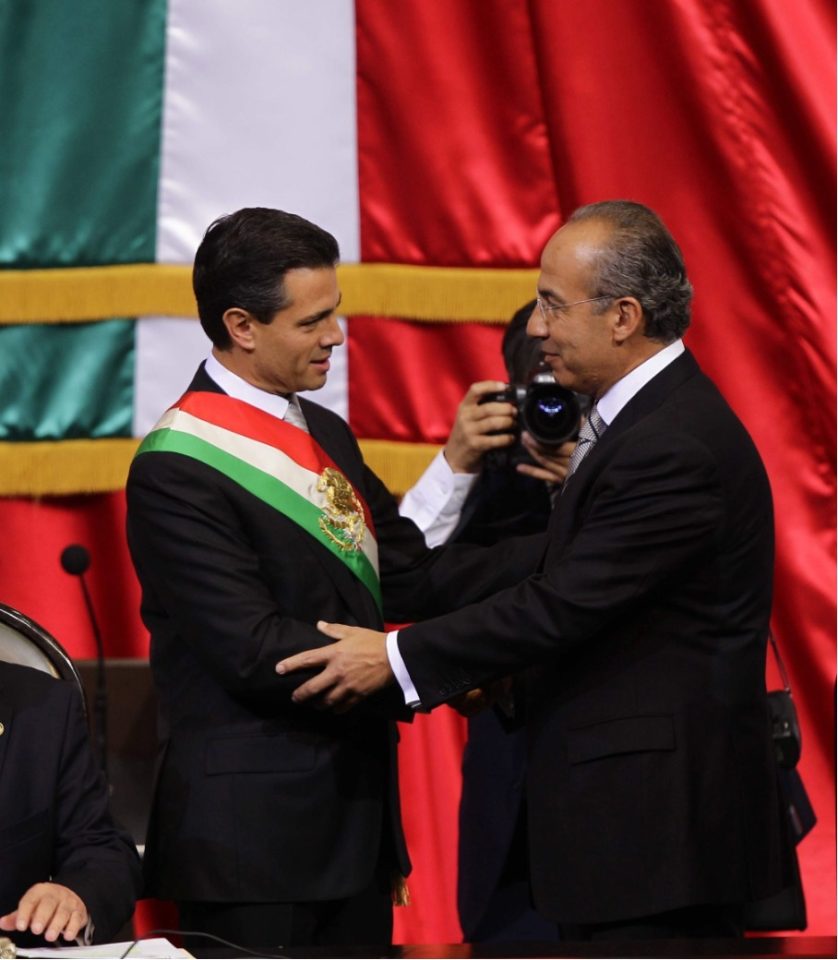Mexico’s political system faces a defining moment

Mexico may be on the verge of a paradigm shift. Governments, politicians, public institutions and parties are mired in their worst crisis in recent history. Corruption, impunity, lack of transparency, a lack of accountability and misuse of public funds have caused Mexican society’s largest collective rejection of politicians since 2000. Establishment figures seem not to understand – or do not want to acknowledge – that they are at the bottom of a deep pit with no way out.
In a recent poll published by research firm Buendia y Laredo, it became clear what Mexicans think of their political parties: an amazing 84 percent of those surveyed said they have little or no confidence in them. Opposition to public funding for political parties has intensified. In 2017 alone, they received $230 million in public funds for their operations. Private money is not allowed in political campaigns in Mexico.
According to the Mexican Institute for Competitiveness, 83 percent of Mexicans believe that the country’s legislators are both corrupt and out of touch with the citizens they are supposed to represent. The 2018 election will therefore be a big test for Mexico’s politicians. They will have to convince a savvier and more active society that they have changed their ways. A strong challenge from Andres Manuel Lopez Obrador, a candidate from outside Mexico’s main parties, may be just the thing to shake up the establishment.
Morena’s momentum
Many Mexicans now see little difference between the center-left Institutional Revolutionary Party (PRI), which prior to 2000 had held power for more than seven decades, and the center-right National Action Party (PAN), which held power from 2000 to 2012. They want something new, and favor giving the far-left National Regeneration Movement (Morena) party an opportunity to rule. Morena comes down to one man: Mr. Lopez Obrador, the early front-runner among possible candidates for the 2018 presidential election.
Mr. Lopez Obrador, a former mayor of Mexico City, came in second place in the 2006 and 2012 presidential elections, losing to Felipe Calderon and Enrique Pena Nieto, respectively. He has been campaigning all over Mexico for the past 11 years. Every national poll puts him in front.
Mr. Lopez Obrador believes that his example as an “honest” politician will be enough to tackle corruption.
Mr. Lopez Obrador’s diagnosis of the three major threats facing Mexico is correct: poverty, inequality and corruption are still pervasive. What has alarmed many are his proposed solutions. First, he believes that by becoming president, his example as an “honest” politician will be enough to tackle corruption. He has repeated over and over that if the president stops stealing, everyone else will follow. This reflects a stunning ignorance of how deep and complex the problem of corruption in Mexico is. If he wins, the country cannot expect major structural reforms to fight corruption. Not only does it seem that he does not know how to change the system, he also lacks the political will to root out corruption within his own team, several members of which have been involved in scandals.
For many years, Mr. Lopez Obrador has demonized the wealthy and influential as “the power mafia” (la mafia del poder). His hatred for the rich has business leaders afraid of what actions he might take against them. His strongest message has always been “first, we need to help the poor” – even if it means going against the wealthy.
The biggest concern for business leaders is Mr. Lopez Obrador’s sharp criticism of free market policies. He has said he will undo the structural reforms implemented by President Pena Nieto and is selling his proposals for new taxes and fiscal reform as policies that will benefit the lower class despite potentially hurting the middle class. In the 2012 presidential election, when he was leading the polls, the Mexican peso weakened. This could happen again next year if he wins. The central bank, Banco de Mexico, recently said that political uncertainty is now one of the country’s main obstacles to growth.
Mixed record
Some businesses are worried about Mexico turning into another Venezuela if Mr. Lopez Obrador wins. Others, however, anticipating his victory in next year’s election, have begun supporting him. Many business leaders think that if they can get close to him, they might be able to moderate his policies.
Mr. Lopez Obrador has always considered crony capitalism Mexico’s main obstacle to growth. He hopes that his proposals to eliminate it will persuade many business leaders that they can work together. Credit ratings agencies, however, have yet to be convinced. Fitch Ratings and Standard & Poor’s have warned of market volatility if he wins.

His record as a politician is mixed. When he was mayor of Mexico City from 2000 to 2005, he brought down homicide rates (from 9.01 to 7.77 per 100,000 inhabitants) and kidnapping rates (from 1.65 to 1.15 per 100,000 inhabitants). However, the extortion rate grew significantly (from 2.27 to 5.22 per 100,000 inhabitants).
During his administration, foreign direct investment in Mexico City fell from more than $10 billion to as low as $3.45 billion and unemployment rose from 3.9 percent to 5.6 percent.
Mr. Lopez Obrador has been a strong critic of President Pena Nieto’s energy sector reforms, promising that if he wins, his administration will not grant new energy-sector licenses and will audit all those issued to private firms over the past six years. He frequently repeats that he favors foreign investment, as long as it does not hurt Mexico’s interests. However, his nationalist rhetoric tells a different story. For example, he frequently quotes President Lazaro Cardenas (1934-1940), who expropriated foreign oil assets in 1938.
His policies could also lead to social unrest. Thousands of public sector workers may lose their jobs, since he is likely to fire those who have worked under previous administrations and bring in people loyal to him. If this plays out, and if unemployment rises as it did while he was mayor of Mexico City, Mexicans could take to the streets.
Once in office, Mr. Lopez Obrador will probably tone down his rhetoric.
Once in office, however, Mr. Lopez Obrador can be expected to tone down his rhetoric. His past shows that he is willing to “forgive” business leaders and members of the “power mafia” if they repent. He has declared publicly that any person of goodwill can join his movement, even those who had previously been “enemies.” To prove his argument, some of these have already been invited to join his team as “special advisors.”
Recently, he admitted that not every promise made during a campaign can be kept (at the time he was referring to U.S. President Donald Trump). This attitude indicates that he may be willing to change his stance on some issues, potentially taking less of a hard line – but it also fuels uncertainty. The question comes down to how far Mexicans are willing to let him go.
Establishment cooperation
The PRI and PAN will go to almost any lengths to keep Mr. Lopez Obrador from becoming president, including aiding each other. In 2006, PAN’s Felipe Calderon won by a tiny margin – 0.62 percent, less than 250,000 votes in an electorate of 41 million. He only did so with the PRI’s support. The reverse occurred in 2012, when Mr. Pena Nieto from the PRI started losing ground in the polls to Mr. Lopez Obrador until PAN began running negative campaign ads against him. PAN, the social-democratic Party of the Democratic Revolution (PRD) and the Citizen’s Movement party (Movimiento Ciudadano) have already decided to create an alliance ahead of the election. If the PRI falls behind, it will work with them against Mr. Lopez Obrador.
President Pena Nieto has two main goals as his term winds down. First, he wants to ensure that his successor does not take legal action against him and his closest allies. Second, he wants his reforms to keep moving forward. He knows that if Mr. Lopez Obrador wins, both will be at risk.
The PRI and PAN will go to almost any lengths to keep Mr. Lopez Obrador from becoming president.
He and former President Calderon have worked together to prevent Mr. Lopez Obrador from being elected before. Margarita Zavala, Mr. Calderon’s wife, originally wanted to run as the nominee from PAN, but has decided to campaign as an independent. She has performed well in the polls and is much more palatable to the PRI than PAN’s likely nominee, party president Ricardo Anaya.
President Pena Nieto will select the candidate from the PRI, and recently changed the party’s rules to allow nonparty members to become candidates. He will probably choose Secretary of Finance Jose Antonio Meade, an independent who has also served as secretary of foreign affairs and secretary of social development, as well as secretary of finance and secretary of energy under President Calderon. Mr. Meade has a very good reputation and has so far remained untouched by any corruption scandals. He is not perceived as a traditional politician, exactly what the PRI needs.
His close relationship with former President Calderon suggests that he might be the right person to negotiate with Margarita Zavala to form a united front against Mr. Lopez Obrador. If they can prevent him from winning, major changes to economic policy or structural reforms should not be expected. Markets will remain stable.
If Mr. Anaya wins the PAN nomination, he will portray the alliance with the PRD and the Citizen’s Movement as a moderate, centrist option. It is likely to win support from the middle and upper classes. If the grouping wins, major change – both on the economic and social fronts – is also unlikely.
Consolation prize
Even though many Morena supporters could be angered by their candidate’s third loss in a row, there is no major risk of social upheaval. Earlier this year, Morena’s Delfina Gomez lost the gubernatorial race in the state of Mexico to the PRI’s Alfredo del Mazo, President Pena Nieto’s cousin. There were widespread allegations that Mr. del Mazo won due to vote-buying and misuse of public funds, but Morena supporters did not hold any major demonstrations.
Frustration at the current political system could open the door for a stronger and more proactive civil society.
If they win, the establishment parties will probably offer Mr. Lopez Obrador a consolation prize to keep him from stirring up trouble. Certainly, he will maintain huge influence over Mexico City, Morena’s strongest bastion of support, if its candidate, Claudia Sheinbaum, wins the city’s mayoral election in 2018.
The next few months will be crucial for Mexico. The country’s social awakening could shake up the establishment, forcing parties to redefine their strategies and messages. Anger and frustration at the current political system could open the door for a stronger and more proactive civil society.
However, there is a big risk that the fear and division sowed by political parties could prevent this transformation. The establishment would remain unchanged, while creating a facade to make it appear as if the country is moving forward. If corruption is not decisively fought, the economic problems that plague Mexico could turn anger into social upheaval.








